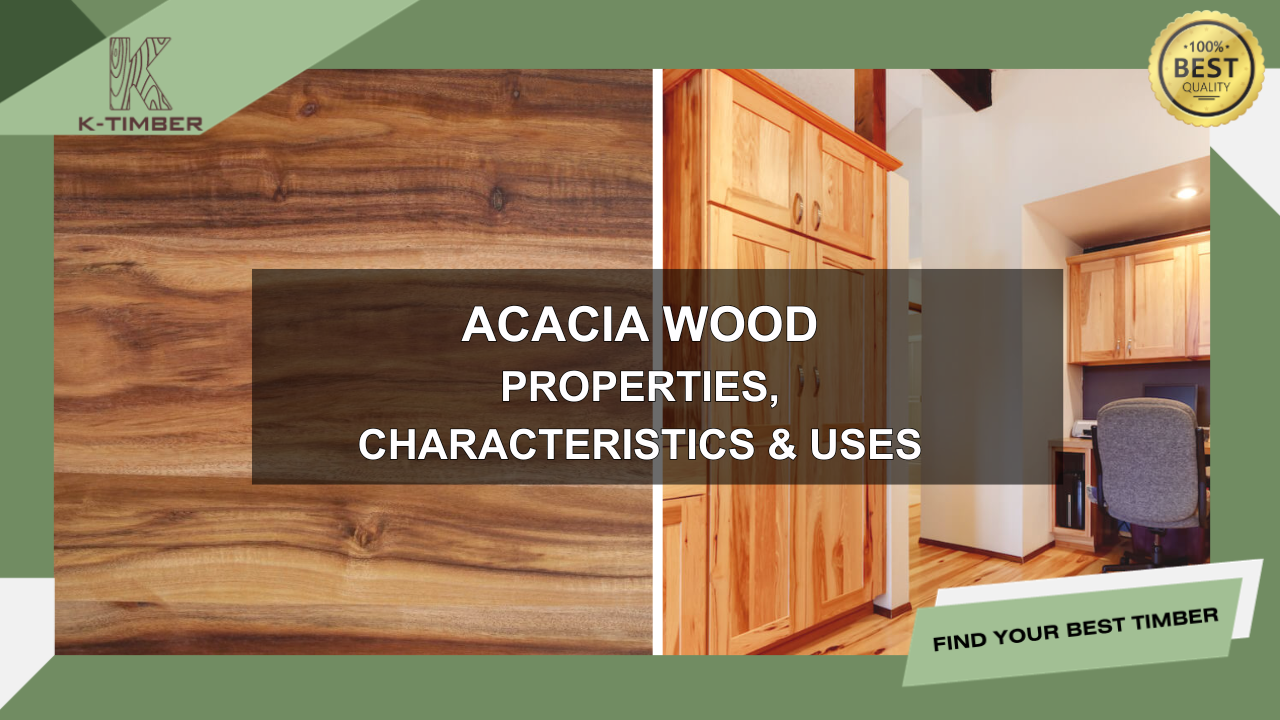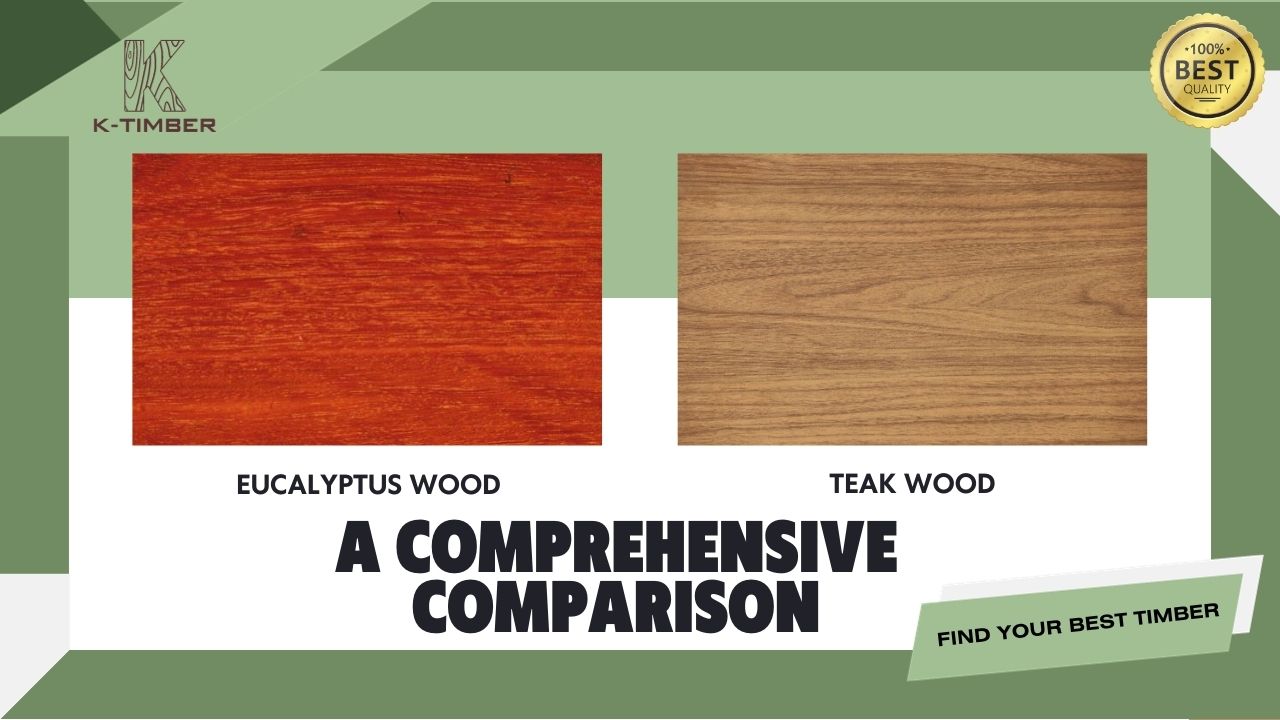Acacia wood is a popular choice in woodworking and furniture-making due to its durability, beautiful grain, and versatility. Whether you’re crafting high-quality furniture, laying down durable flooring, or searching for a versatile material that will stand the test of time, acacia wood offers exceptional benefits.
This blog will explore acacia wood’s properties, characteristics, and uses, providing valuable insights for those considering it for their next project.

Table of Contents
1. Acacia Wood General Information
Acacia wood (Scientific name: Acacia Mil), derived from the Acacia tree, a large genus with over 1,000 species, primarily found in Australia, Africa, and parts of Asia. This hardwood is known for its impressive strength and durability, making it a prime choice for both indoor and outdoor furniture. Acacia wood is also used for flooring, cabinetry, and decorative items. Its natural resistance to decay, insects, and moisture further enhances its appeal, especially in humid environments.

2. Acacia Wood Properties
2.1. Color and Texture
Acacia wood is renowned for its striking visual appeal. The heartwood can vary from light amber to a deep, rich brown, often featuring darker streaks that add to its character. The sapwood, on the other hand, tends to be lighter in color, providing a beautiful contrast. The texture of Acacia wood is generally smooth with a medium to coarse grain, which gives it a luxurious and natural finish. The wood’s natural luster enhances its aesthetic, making it a preferred choice for high-end furniture.
2.2. Density and Strength
Acacia wood is a dense and strong hardwood, with a density that ranges from 600 to 800 kg/m³. This high density contributes to its exceptional durability, making it resistant to scratches, dents, and other forms of wear and tear. Acacia wood is also known for its impressive strength, which allows it to withstand heavy use and harsh environmental conditions. This makes it an excellent material for furniture that needs to endure significant stress and usage.
May you interested: The Difference Between Hardwood and Softwood
2.3. Workability
Despite its density, Acacia wood is relatively easy to work with. It can be sawn, planed, and turned with standard woodworking tools. The wood holds screws and nails well, although pre-drilling is recommended to prevent splitting. Acacia wood also glues well and takes finishes beautifully, allowing for a wide range of finishes from natural oils to varnishes. However, due to its interlocked grain, it may sometimes pose challenges during machining, so sharp tools are essential for the best results.
3. Acacia Wood Technical Properties
| TECHNICAL PROPERTIES | VALUE |
|---|---|
| Average Dried Weight | 41 lbs/ft³ (655 kg/m³) |
| Specific Gravity (Basic, 12% MC) | 0.55, 0.67 |
| Janka Hardness | 1,700 – 1,750 lbf (7,780 N) |
| Modulus of Rupture | 16,400 lbf/in² (113.1 MPa) |
| Elastic Modulus | 1,970,000 lbf/in² (13.6 GPa) |
| Crushing Strength | 9,500 lbf/in² (65.5 MPa) |
| Shrinkage | Radial: 4.4%
Tangential: 7.7% Volumetric: 12.0% T/R Ratio: 1.8 |
Acacia wood is not only strong and durable but also boasts impressive technical properties. It has a Janka hardness rating of around 1700 lbf, which makes it harder than oak, another popular hardwood. This high hardness ensures that Acacia wood products are long-lasting and can resist surface damages effectively. Additionally, Acacia wood has a low shrinkage rate, which means it remains stable and resists warping and cracking even in fluctuating temperatures and humidity levels.
4. Acacia Wood Advantages
- Durability: Acacia wood is tougher than many other commonly used furniture woods, such as European white oak, teak, carbonized bamboo, and maple. Its high density and hardness make it one of the most durable hardwoods available, suitable for both indoor and outdoor use. It also has a natural shine that lasts for years with minimal upkeep.
- Aesthetic appeal: The rich color variations and natural luster of Acacia wood add elegance and warmth to any space.
- Water – resistant: Acacia wood naturally resists water, making it ideal for outdoor furniture or pieces that frequently come into contact with moisture. Even without additional water-resistant treatments, acacia wood furniture can endure for decades without suffering damage.
- Antibacterial: Acacia wood is also naturally resistant to bacteria, reducing the risk of mold or wood rot over time. That’s why it is ideal for kitchen items like serving trays and chopping boards, as it can handle exposure to liquids without deteriorating.
- Sustainability: Many species of Acacia are fast-growing, making it a more sustainable option compared to slower-growing hardwoods.

5. Acacia Wood Disadvantages
- Heavy weight: The density of Acacia wood, while a sign of its strength, also makes it relatively heavy, which can be a drawback in certain applications.
- Irregular grain: Acacia wood’s irregular grain and unpredictable knots can be a drawback, especially if you prefer a consistent grain pattern. The wood’s knots, due to the tree’s many branches, can appear in various forms and locations, potentially weakening the wood. This can be problematic for load-bearing projects like bed frames. If uniformity and strength are crucial for your project, acacia may not be the best choice.
- High-maintenance: Another thing you should know about acacia wood is that it’s very high-maintenance. To prevent cracking from dryness, it requires regular wiping with a moist cloth, avoiding harsh cleaners with ammonia or silicon. Additionally, you need to oil the wood with specific preservatives and apply a finishing oil with UV protection. While durable, the upkeep can be time-consuming and costly, leading some to opt for less demanding wood types.
- Temperature sensitivity: Acacia wood isn’t ideal for outdoor use in areas with extreme temperature changes. It can dry out and crack in hot climates or with temperature fluctuations. Humidity, rain, or snow can cause swelling. If you choose acacia for outdoor furniture, rotate pieces indoors periodically and keep them away from direct heat sources.

6. Acacia Lumber Uses
Acacia wood is incredibly versatile and can be used in a variety of applications:
- Furniture: One of the most common applications for acacia wood is in the creation of furniture. From dining tables to outdoor benches, Acacia wood is a top choice for durable and stylish furniture.
- Flooring: Acacia is not only highly durable with an impressive PSI rating, making it resistant to damage from heavy use, but it also offers a visually attractive appearance and excellent water resistance, making it a great option for high-traffic area, adding warmth and character to any space.
- Cabinetry: The wood’s natural beauty and durability make it an ideal material for cabinets and kitchen countertops.
- Outdoor projects: Acacia’s natural resistance to moisture and insects makes it ideal for outdoor furniture, decking, and garden structures.
- Decorative items: Acacia wood is often used for decorative pieces such as bowls, cutting boards, and carvings, showcasing its fine grain and natural luster.

Read now: Acacia wood vs Eucalyptus wood: Which is better for outdoor funiture?
7. Alternatives Wood Species for Acacia
Acacia wood is a popular and versatile hardwood with a wide range of applications, valued for its durability and distinctive grain. It typically falls within the price range of $650-$750/m³. However, if you’re looking for alternatives that offer unique advantages, you might consider Doussie wood.
Doussie, also known as Afzelia, is highly prized for its rich, golden-brown color and exceptional hardness, making it ideal for flooring, furniture, and outdoor applications. Its resistance to wear, moisture, and insects ensures long-lasting performance, much like Acacia wood.
Read now: Doussie Wood: Properties, Characteristics & Uses
For high-quality Doussie wood and other premium hardwoods like Sapelli, Acajou, Iroko, and more, K-TIMBER is your trusted supplier. Contact K-TIMBER today to explore these options and secure the best deals for your upcoming projects.










